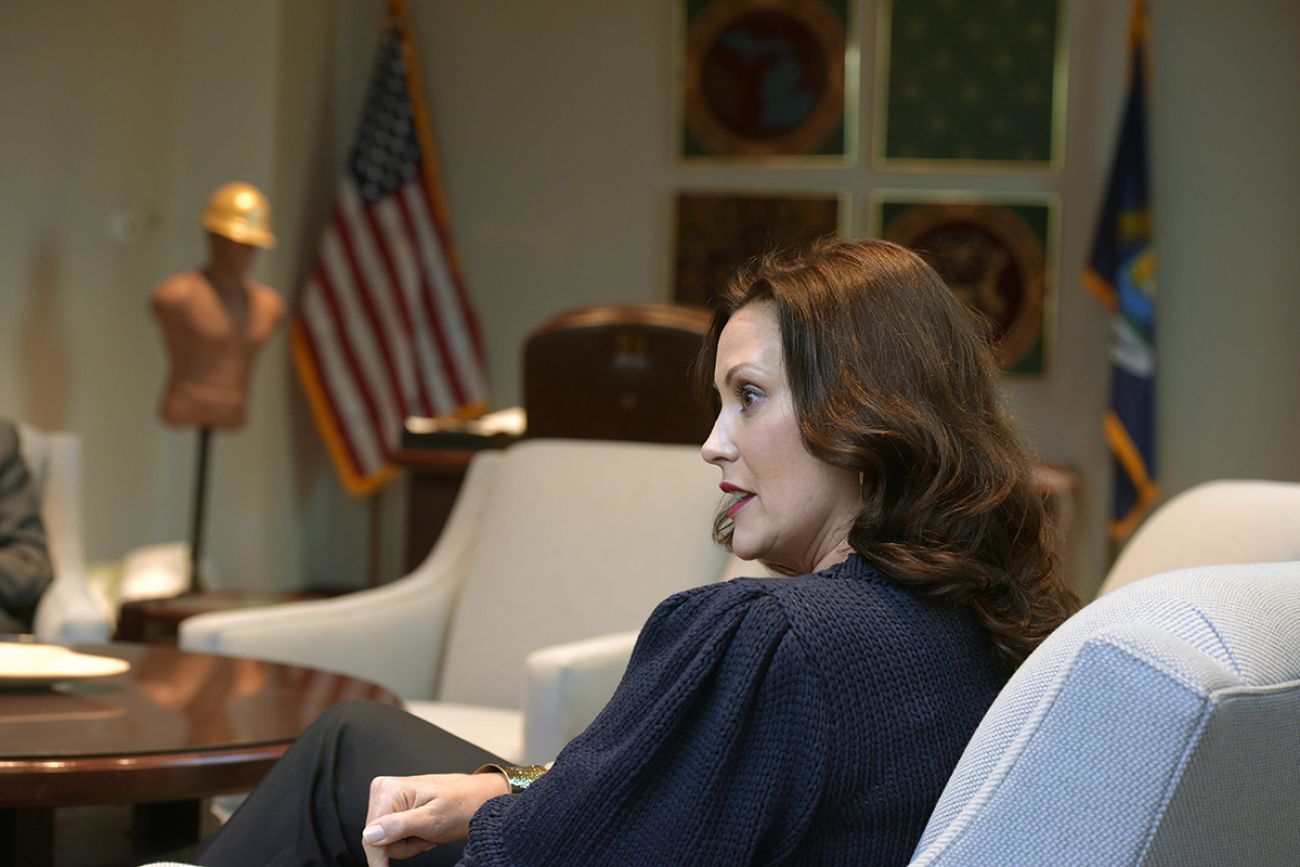Gretchen Whitmer pitches earmark transparency. See who added $600M in ‘pork’

- Gov. Gretchen Whitmer pitches plan for Michigan lawmakers to publicly sponsor earmarks before votes
- Lawmakers in recent years have added billions of dollars to budgets for pet projects in their districts
- House Republicans adopted their own earmark transparency rules but the Senate has not followed suit
LANSING — Gov. Gretchen Whitmer will propose new earmark transparency rules for lawmakers as part of her government spending plan for next fiscal year, the state Budget Office told Bridge Michigan.
Legislators in recent years have added billions of dollars to state budgets for individual projects in their districts, including more than $600 million in grants signed into law last year by Whitmer, which you can review in the graphic below.
The earmarks, also known as "pork barrel spending," are often inserted hours before final votes, with little opportunity for public scrutiny and no readily available information about who will receive the funding and which lawmaker requested it.
The spending, which regularly tops hundreds of millions of dollars, has led to controversy and criminal investigations into a handful of grants. House Republicans, who retook control of the lower chamber this year, last week adopted their own new rules to reform the process.
Whitmer’s earmark proposal would require all grant information — including legislative sponsors — to be posted online for public review five days before the budget passes, and it would prohibit earmarks to for-profit entities, cutting off funds that have previously gone to private developers and companies.
Grants would also have to be approved by appropriations subcommittees, which meet publicly. In recent years many budget earmarks had appeared at the eleventh hour as lawmakers and Whitmer negotiated a final budget deal.
Her proposal would also require a “sponsorship letter” be submitted on letterhead with the legislator, recipient name, grant amount and public purpose included, along with a pledge there is no immediate conflict of interest for the legislator.
The earmark reform plan unanimously approved last week by the House aims to require sponsorship disclosure further in advance than Whitmer’s and also sets new parameters for grants to nonprofits. It passed with unanimous support, but the Senate has not adopted the rules. Whitmer's plan would apply to both chambers.
Related:
- Michigan lawmakers use word games to skirt law, spend billions on pet projects
- Michigan paid $10M before ‘red flags’ froze ex-House speaker’s pet project
- Dana Nessel’s office probing $2M rocket plan that failed to launch
Whitmer's plan is modeled after transparency rules the US House and Senate adopted in 2021 after lifting a decade-long ban on earmarks.
"This proposal brings the state into alignment with the federal government with regard to legislative grants creating a more transparent process," the state budget office wrote in a memo explaining the governor's proposal.
State Budget Director Jen Flood will present the governor's executive budget recommendation to lawmakers on Wednesday at 11 a.m. Unusually, the presentation will come weeks before the governor’s annual state of the state address, which is scheduled for the historically late date of Feb. 26.
Michigan is facing another year of robust revenues. Officials in January revised tax revenue expectations, predicting Whitmer and lawmakers will have nearly $1.7 billion in extra money to spend this year and next.
A controversial history
Republicans and Democrats alike have added earmarks to recent state budgets, a process facilitated by an influx of COVID-era federal aid and a stronger than expected post-pandemic economic rebound that left Michigan with multibillion-dollar surpluses.
Legislators used a portion of the excess revenue for a glut of pork-barrel spending, including $1.4 billion in the 2023-2024 fiscal year budget. There’s more than $600 million in the current fiscal year spending plan, according to a preliminary list provided to Bridge by the State Budget Office.
Beginning in 2023, the Legislature began requiring lawmakers to disclose which earmarks they sponsored — but not until months after they were voted on and approved.
Whitmer signed the current year budget in July, and while the state is not required to publicly disclose the legislative sponsors of each earmark until March 15, the Budget Office gave Bridge its preliminary list this week.
Under the Michigan Constitution, money appropriated for “local or private purposes” is supposed to require a two-thirds vote by the Legislature. State budget earmarks skirt requirements by not explicitly naming who will receive the funds or where it will be spent — further obscuring grants’ origins.
Reporting from Bridge has shown how earmarks are often assigned without oversight and regularly benefit individuals with political access and influence.
A $25 million earmark for a Clare health complex that was added to a budget by former House Speaker Jason Wentworth, R-Farwell, and awarded to a former aide, remains under investigation by Attorney General Dana Nessel. It was never built but $10 million was spent before the state clawed back the remaining funds.
Last year Bridge also chronicled a $5 million earmark for a housing project led by Macomb County developer Jim George, who in the months before and after the budget’s signing donated more than $500,000 to legislators and hired a former legislator to lobby for the funding.
In the most recent budget, the City of Mount Clemens was granted another $2.5 million for the same project.
Another round of earmarks
The earmark process often allows the party in power in the Legislature to grab a disproportionate amount of the extra funding, and last year was no exception.
Democrats, who held a 56-54 seat edge in the House and a 20-18 edge in the Senate, sponsored 324 grants totaling $595.5 million, according to state data analyzed by Bridge.
Republicans on their own secured 23 grants totaling $33.1 million.
Grants included:
- $10 million for Lansing’s Potter Park Zoo. Democratic sponsors — Sen. Sarah Anthony of Lansing, Rep. Emily Dievendorf of Lansing and Kara Hope of Holt said in a sponsor disclosure letter that the earmark will support "renovation of the outdated feline and primate building" to "ensure the continued health and well-being of the animals, and provide continued community programming and learning opportunities for thousands of Michigan residents."
- $4 million for the Jewish Federation of Metropolitan Detroit. Democratic sponsors — Sen. Jeremy Moss of Southfield, Samantha Steckloff of Farmington Hills and Noah Arbit of of West Bloomfield — said the money will help "implement safety and security measures" to protect Jewish residents across Metro Detroit, including security resources at schools and summer camps, additional security patrols and personnel at synagogues during Jewish holidays.
- $5 million to build housing for educators in Traverse City. Sponsoring Rep. Betsy Coffia, D-Traverse City, said the funding will support "one or more housing developments" with units set aside for preK-12 educators and support staff.
- $7 million for the Detroit Zoo. Thirteen Democrats sponsored the earmark, which they said would help the zoo continue "urgent water infrastructure improvements" that would otherwise face 'significant risk to structures and animal habitats."
- $2.5 million for an indoor sports facility in Oceana County's Shelby Township. Sponsoring Sen. Jon Bumstead, R-North Muskegon, said the enclosed facility will allow local residents to "enjoy sports or public activities inside, out of the elements, especially during the winter months or during inclimate (sic) weather days."
- $3 million for the Michigan Independent Retailers Association, an interest group representing small grocers and convenience stores, to “combat food deserts in Michigan.” The sponsor, Rep. Sylvia Santana, D-Detroit, wrote the grant will “provide equipment to enable small stores to inventory” fresh foods as well as provide stores with inventory software.
The House proposal
The Republican-led House last month unanimously adopted new rules to shed light on which lawmakers sponsor budget earmarks prior to any votes.
That plan, which differs from Whitmer’s, will require lawmakers to submit funding requests to the House Business Office at least 14 days before any votes, and all of the requests would have to appear online by April 1 in future years — months before budgets usually receive final votes.
Lawmakers sponsoring an earmark would have to explain how it would provide a “public benefit” and name the organization receiving the grant. Nonprofit entities would also have to verify that they had been active and operating with an office in Michigan for at least the past year.
The House’s rules have not been adopted by the Senate, where Democrats hold a majority, and it’s unclear whether they intend to entertain the plan.
See what new members are saying about why they donated to Bridge Michigan:
- “In order for this information to be accurate and unbiased it must be underwritten by its readers, not by special interests.” - Larry S.
- “Not many other media sources report on the topics Bridge does.” - Susan B.
- “Your journalism is outstanding and rare these days.” - Mark S.
If you want to ensure the future of nonpartisan, nonprofit Michigan journalism, please become a member today. You, too, will be asked why you donated and maybe we'll feature your quote next time!




